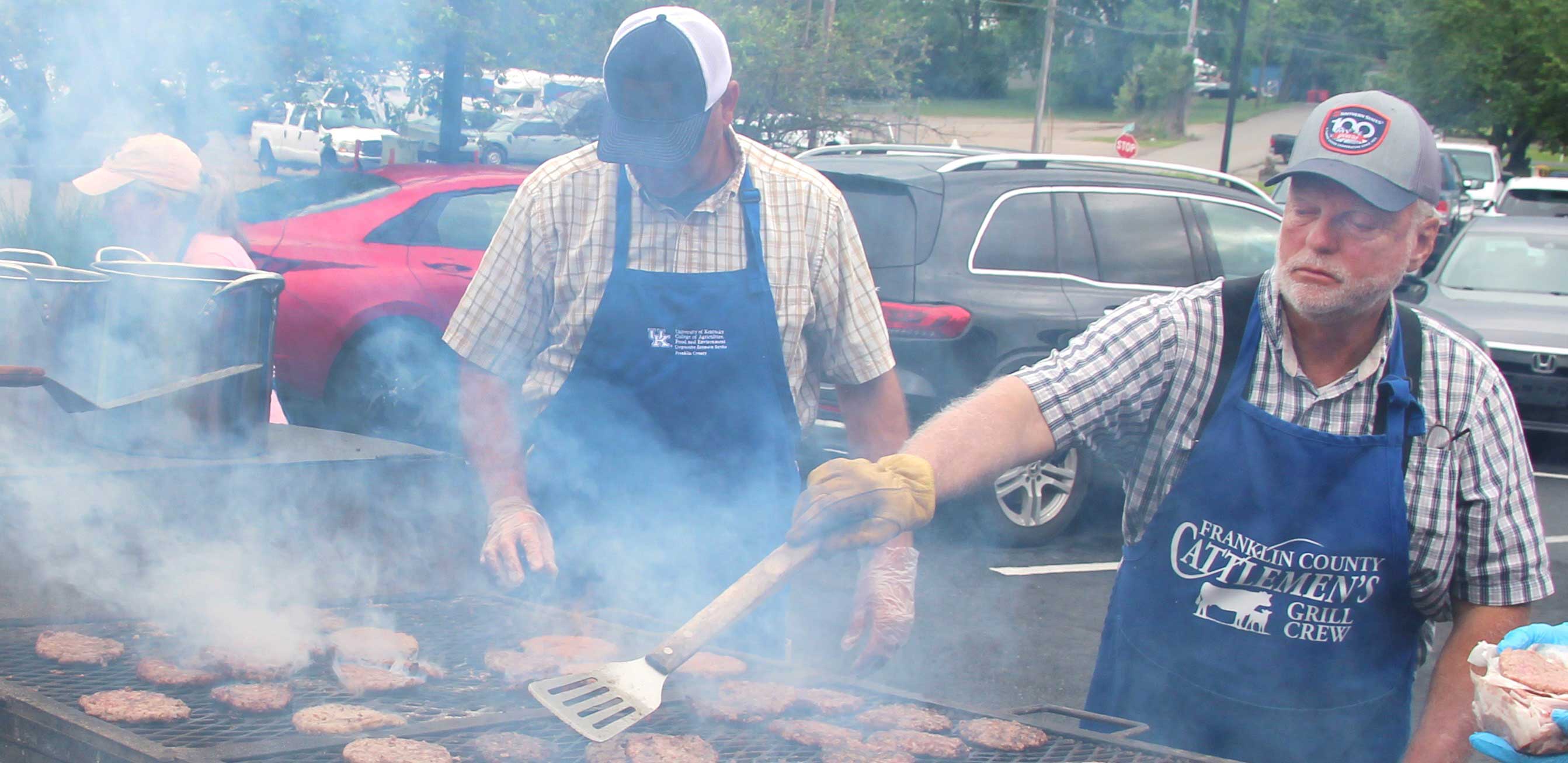
Franklin County Cattlemen Kerry Redding, right, and Jonathan Moore grill burgers May 6 as KDA commemorated Beef Month.
MAY
What’s the state of Kentucky’s cattle industry? We asked the ‘experts’
By Chris Aldridge
Kentucky Ag News
Three members of the Franklin County Cattlemen’s Association share their opinions on the state of Kentucky’s cattle industry.
The participants:
Diana Hogan
Breed: Belgian Blue crossbreeds
Head: 50-60
Market: Franklin County Farmers’ Market
Jonathan Moore
Breed: Angus and a few crossbreeds
Head: 12 cows plus feeder calves
Market: Bluegrass Stockyards and private buyers
Kerry Redding
Breed: n/a
Head: 50
Market: Owenton and Bluegrass stockyards
QUESTION: Are you satisfied with the current state of Kentucky’s beef industry?
Moore: “Yeah, things are good right now. Prices are very good right now, unless you’re buying!”
Redding: “Yeah, I guess so. I don't really know anything that I'm dissatisfied with.”
Hogan: “I'm satisfied with it. I don't have as many cattle as I used to because it is just me, so I've decided to make it more manageable.
“I'm retired, so this is sort of my retirement job. My brother, who actually got us into this, lives in Texas. He went to the Houston Livestock Show, saw these cattle there, and was just so impressed that every time he called home, that's all he talked about – ‘We need to try these Belgian Blue cattle.’ They're a double-muscled, low-fat animal. The meat is just terrific. We’re probably the only ones in Kentucky (that raise Belgian Blues).
“It started out as a family thing, but I'm the only one left doing it. Everybody else has either quit or died. My son-in-law helps me, and my brother comes in three or four times a year. When he comes in, we work the calves, so I don’t do it all by myself – I can't do it all by myself!”
QUESTION: Is your farm better off now than it was five years ago?
Moore: “I would say yes…. I have taken advantage of a couple of those (government programs) to help. It makes life easier. The farming industry, it’s tough.”
Redding: “About the same.”
Hogan: “Yes.”
QUESTION: Is your farm better off now than it was 10 years ago?
Redding: “You get more money (selling your cattle), but you end up with the same (profit).
“Everything has gone up so much…. I can remember my grandparents saying, ‘I gave (paid) more for this car than I gave for my first house.’ My first farm, I bought it back in the ’80s for $100,000. Now, you can’t even buy a dadgone truck for $100,000.
“In ’15, cattle (prices) jumped up there really high, and I thought, ‘Man this is gonna be great!’ …Then the next year, it dropped off. Now we're back up again.”
Hogan: “Yes. My mom helped me 10 years ago.”
Moore: “Ten years ago, it was different. We milked. We had a dairy farm.”
QUESTION: What does Kentucky’s cattle industry do well?
Moore: “We’ve got good farmland for cattle, and we have a lot of distilleries, so you get a lot of by-products (distillers’ grain) to keep your input low, which is a big help to the farmers.
“Our local farmers are processing more to sell local beef. I think that's really jumped in the last few years. I think that's a big thing, and I think it's a good thing. You know where your beef is coming from for sure. A lot of people want grass-fed beef, so that's an option that you can get. So just over the past five to 10 years, things have really improved.”
Redding: “A lot of new people are buying little farms, wanting to get into different niches in the cattle market. I’d say we do that really well as far as specialty beef, like grass fed…. I think they're doing really well because people are getting a little bit untrusting of the big-time processors.”
Hogan: “I think we have a lot of support for the cattle industry. I don't do commercial sales like most cattle farmers do. We keep ours (cattle), and we process them and sell (the beef) ourselves.”
QUESTION: In what ways can Kentucky improve its cattle industry?
Hogan: “We've gotten more (local processors) – COVID helped that. During COVID, a lot of places shut down. You couldn't get beef processed. There have been several (small processors) that have opened up since then.”
Redding: “FFA has really grown big time in the schools, and a lot of them are girls. Women have really grown in the industry. There’s a lot of women farmers…. It seems like it's picked up in the last few years, so that’s an improvement.”
Moore: “I think we're in a good spot.”

